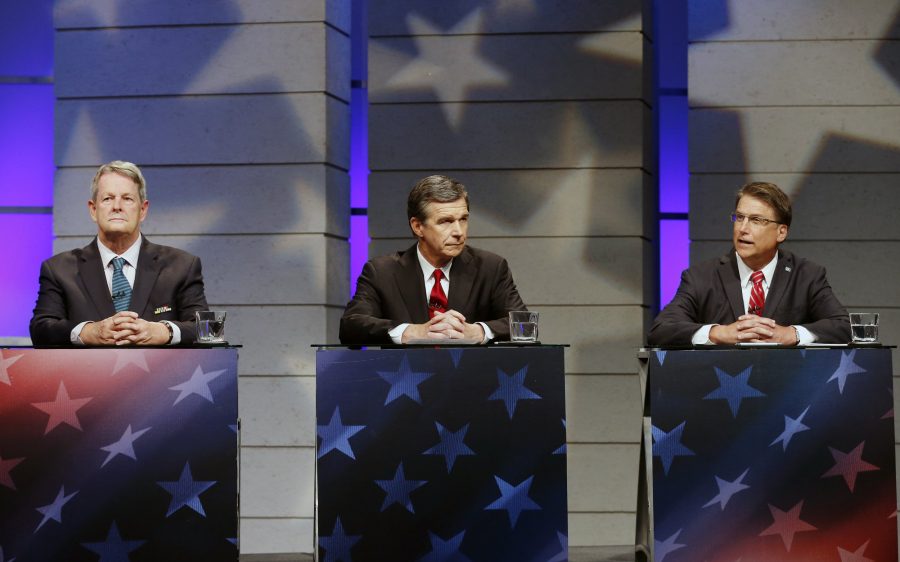The final countdown until the polls open on Nov. 8 is on.
Hillary Clinton and Donald Trump are dominating the news cycle more than ever, though just as important are the gubernatorial and senate races.
The highly visible presidential election should have an effect on local elections as well.
“Presidential campaigns generally have effects on down-ballot races, primarily by driving voter turnout and boosting support for candidates for congressional and state offices,” said politics professor John Dinan. “And so the extent to which Trump or Clinton are able to attract more of their voters to the polls in North Carolina will have an affect on down-ballot races.”
North Carolina is considered a battleground state because of its sizeable population and the unpredictability of its electorate.
“North Carolina has a long history of ticket-splitting whereby voters are comfortable voting for one party at the top of the ticket and other parties for other offices,” Dinan said. “In fact, in four straight elections from the 1990s to the early 2000s, North Carolina voters backed the Republican presidential candidate and the Democratic gubernatorial candidate.
According to a “NYT”/Siena poll released on Oct. 25, Democrat Roy Cooper leads incumbent Republican Gov. McCrory by six points with about two weeks until the election.
McCrory’s poll numbers took a hit earlier this year with his signing of House Bill 2 (HB2), which omitted sexual orientation and gender identity as protected status. A better known clause also states that one must use the bathroom that corresponds with the sex on their birth certificate. Many businesses, including PayPal and the NBA, have boycotted North Carolina because of the controversial bill.
McCrory has tried to shift voters away from the bill and to other issues.
“McCrory would like the focus to be placed on the drop in the state’s unemployment rate, his role in cutting the state’s debt to the federal government for unemployment insurance, increases in teacher pay during his term in office and his leadership in hurricane-relief efforts,” Dinan said.
Cooper, 59, the current Attorney General, has highlighted, in addition to HB 2, McCrory’s association with legislation passed by the Republican legislature.
“Cooper would like the focus as much as possible on HB2 and McCrory’s role in signing it and secondarily on McCrory’s inability to prevent the Republican legislature from passing laws restricting abortion access and reducing the number of days of early voting,” Dinan said.
Junior Sabin Sidney, though not registered in North Carolina, supports McCrory because of his stances on the Affordable Care Act, fiscal policy and student loans. Sidney, a Republican, says that HB2 did not affect his perception of McCrory.
North Carolina’s senate race is also gaining attention across the country, because it could be one of the races in the U.S. that determines whether Republicans maintain their majority.
Deborah Ross is a 53 year old lawyer from Raleigh who served as director of the state American Civil Liberties Union.
In an Oct. 25 “NYT”/Siena poll, Ross leads incumbent Republican Richard Burr by one point. Unlike some states, incumbents are not as easily reelected in the Senate in North Carolina.
“North Carolina senate races are invariably competitive,” Dinan said. “In fact, during the last four decades, only one of North Carolina’s senate contests has seen a candidate win by a double-digit margin. In a number of other states, senate incumbents coast to re-election.
“But not in North Carolina, where senate incumbents have to fight to hold on to their seats. And so it is no surprise that North Carolina’s 2016 senate race is in keeping with this trend.”
Burr, like other Republicans, has been faced with the challenges of being associated with Trump as well McCrory and the HB2 controversy.
Ross, however, has faced backlash over some of the people she defended as director of the state American Civil Liberties Union. She, at one time, defended the rights of convicted sex offenders and flag-burners during her career.
Regardless of partisan differences, the rhetoric of the significance of gubernatorial and senate elections in North Carolina persists.










